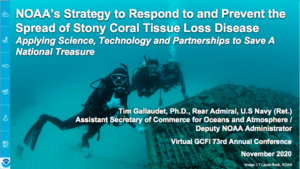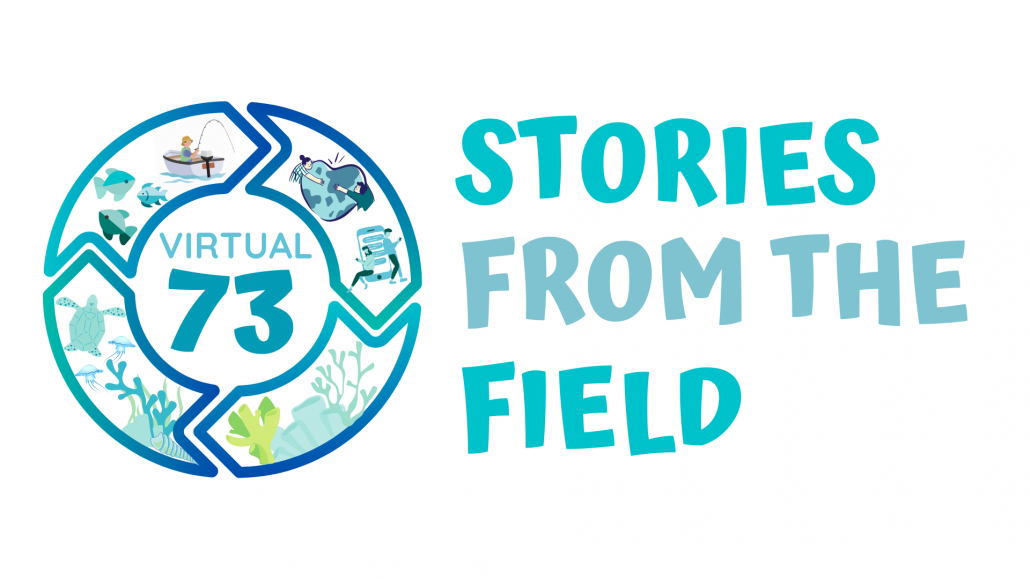
Quick Links
Our Virtual Approach to GCFI73
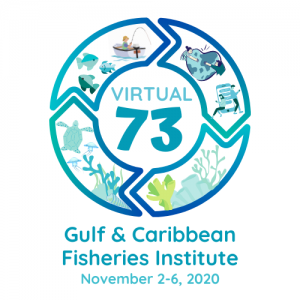 GCFI is pleased to announce that the 73rd annual meeting of the Gulf and Caribbean Fisheries Institute (GCFI73) is being run as an entirely virtual event. GCFI73 will be a mix of science and fun activities comprised of an e-poster session, invited talks, workshops, a Speed Science Student Competition, a GCFI Story Slam, and the CINEFISH Film Festival. It is the intention of GCFI to provide the current state of the science while also infusing entertaining elements into the event.
GCFI is pleased to announce that the 73rd annual meeting of the Gulf and Caribbean Fisheries Institute (GCFI73) is being run as an entirely virtual event. GCFI73 will be a mix of science and fun activities comprised of an e-poster session, invited talks, workshops, a Speed Science Student Competition, a GCFI Story Slam, and the CINEFISH Film Festival. It is the intention of GCFI to provide the current state of the science while also infusing entertaining elements into the event.
This innovative way of connecting with our membership from around the Caribbean and the globe will provide an opportunity for scientists, managers, students, government officials and other stakeholders to share new research, experiences and case studies. This virtual approach will not only include some of the special events you know and love in new formats but it will also allow participants to gather and discuss information while networking with their peers during the COVID-19 pandemic.
There will be live interpreting of all main events (English – Spanish)
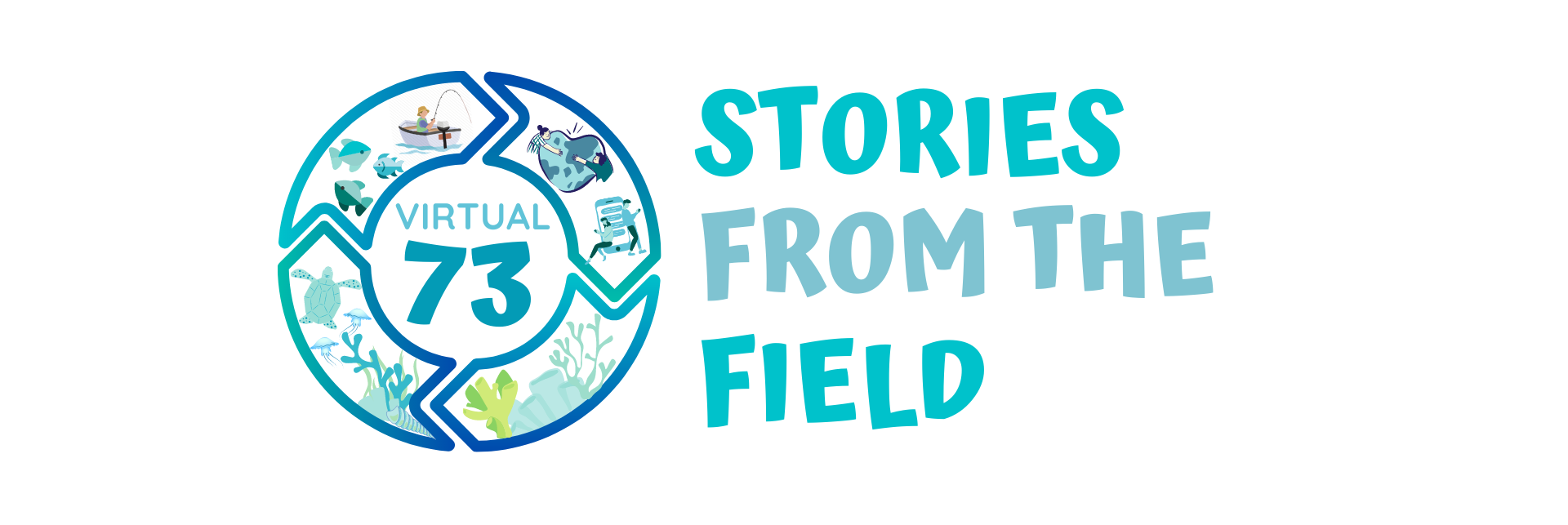 The theme of this year’s meeting is GCFI73: Stories from the field
The theme of this year’s meeting is GCFI73: Stories from the field
The meeting will bring together regional stakeholders to present success stories from around the Gulf and Caribbean. Providing the opportunity to discuss stakeholders’ experiences related to managing marine resources and fisheries in the face of climate change will increase knowledge. By bringing together scientists, academics and practitioners to share case studies, we can collaboratively identify lessons learned and present strategies for managing multispecies fisheries options that could be scaled-up around the world.
The focus of GCFI73 will be on highlighting diverse stories that stimulate more effective communication among stakeholders to benefit people and ecosystems. The focus will be on highlighting approaches that lead to successful outcomes such as those that:
- Identify best practices for effective conservation and sustainable use of Gulf and Caribbean resources
- Strengthen alliances between science and beyond by conveying innovative cooperative relationships that support implementation of ocean-related solutions.
- Promote transboundary, and national initiatives, transdisciplinary networks and research partnerships
 The registration for GCFI73 will be FREE to all attendees and includes participation in special and thematic sessions, eposter session, the GCFI Story Slam, the CINEFISH film festival and other informal events. To participate, registration is necessary and can be completed on the Conference Registration Page.
The registration for GCFI73 will be FREE to all attendees and includes participation in special and thematic sessions, eposter session, the GCFI Story Slam, the CINEFISH film festival and other informal events. To participate, registration is necessary and can be completed on the Conference Registration Page.
Please note you will need to login to register. GCFI73 will be free to members and non-members alike
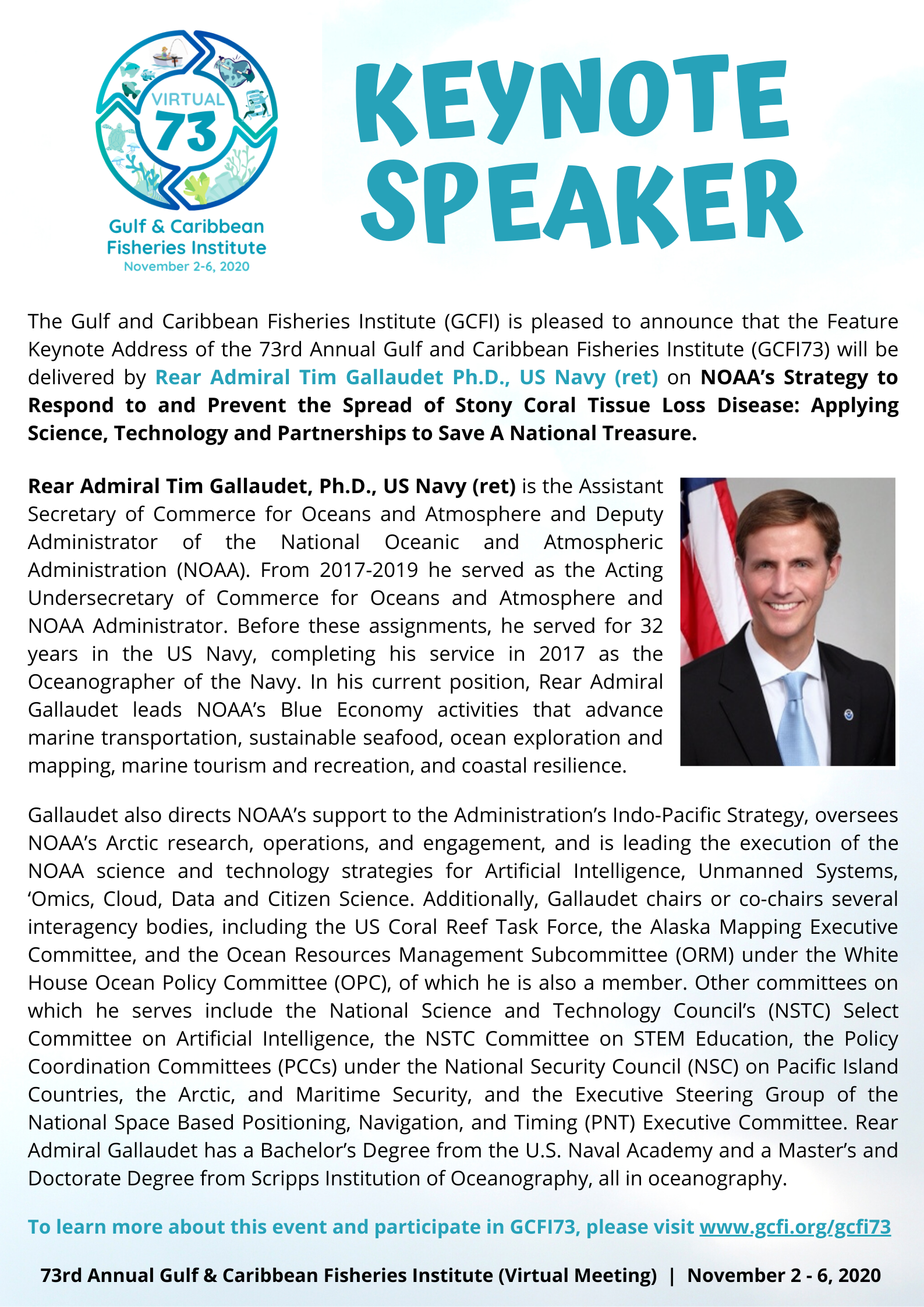
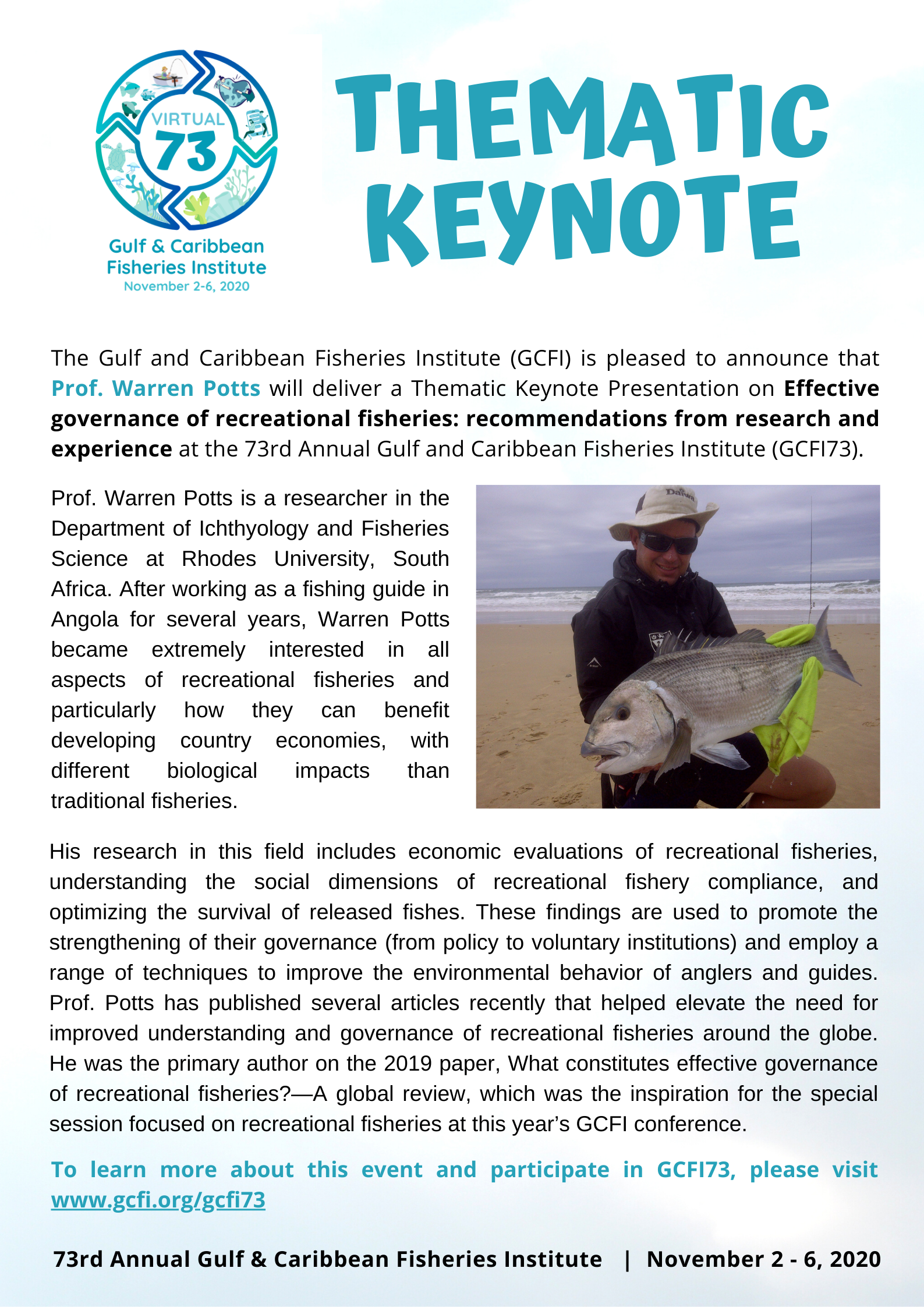
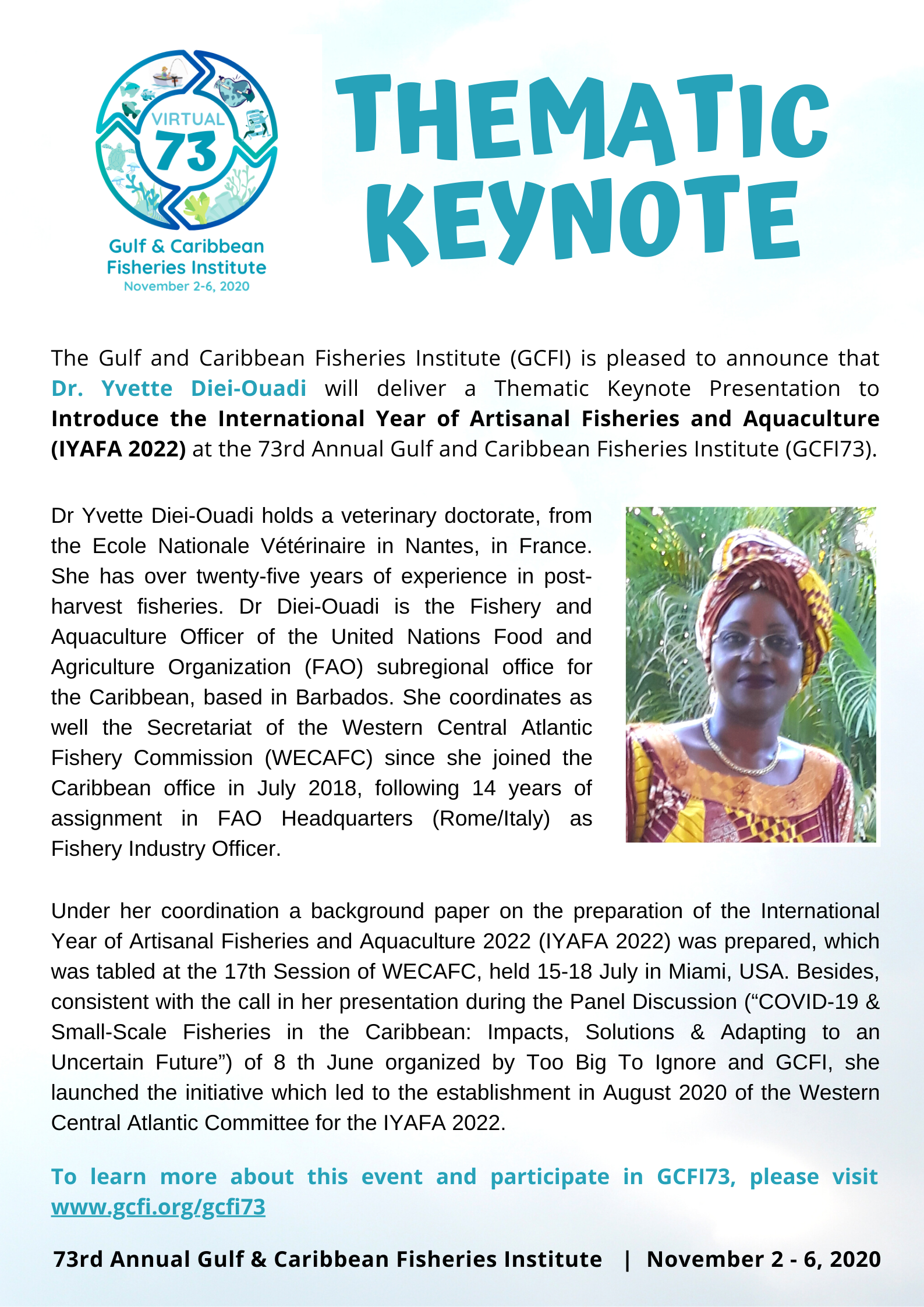
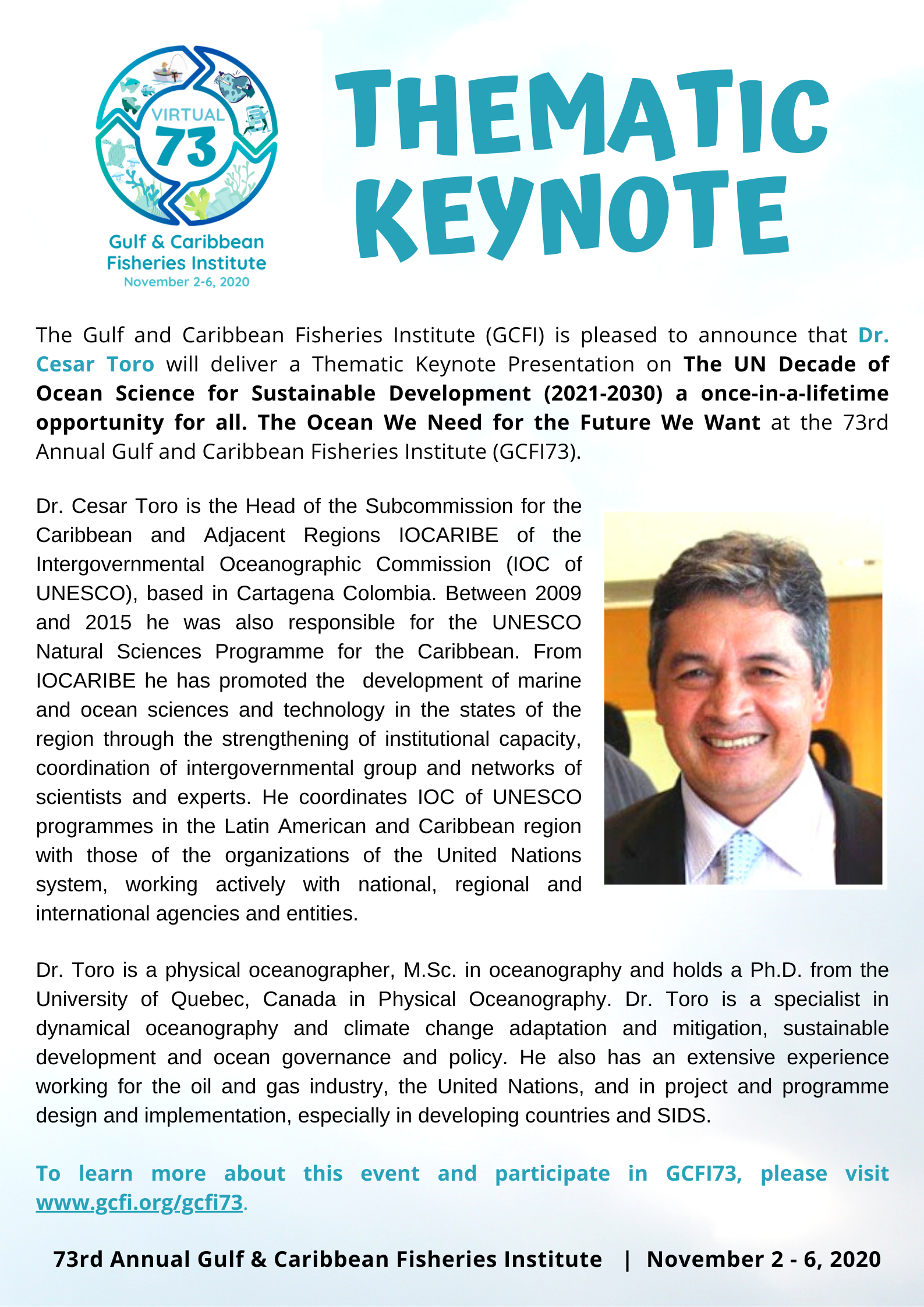
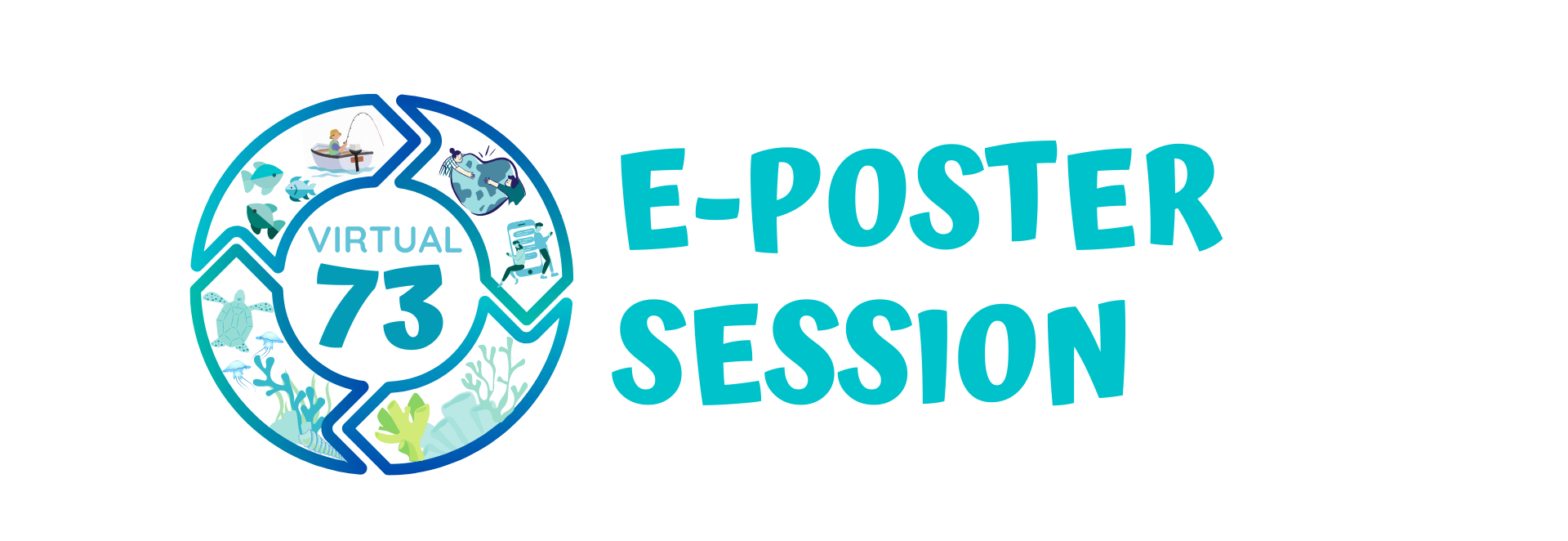 At GCFI73 we will showcase dynamic electronic posters (e-posters) which will be available to view from 28th October 2020. All e-posters will remain accessible online even after the conference has ended so there can be further discussions and interactions. Each presenter will have the ability to communicate directly, answer questions and connect with the audience via the built-in “chatbox” on the e-poster. There will also be a general e-poster session on Monday 2 November where further connections can be made
At GCFI73 we will showcase dynamic electronic posters (e-posters) which will be available to view from 28th October 2020. All e-posters will remain accessible online even after the conference has ended so there can be further discussions and interactions. Each presenter will have the ability to communicate directly, answer questions and connect with the audience via the built-in “chatbox” on the e-poster. There will also be a general e-poster session on Monday 2 November where further connections can be made
Abstracts must be submitted online via the GCFI73 Abstract Submission Page by October 1, 2020.
We will be using the Learning Toolbox Platform for this session. You can explore a sample e-poster here, view an instructional video on how to prepare an e-poster or explore the Written Guide to Creating an E-Poster. Although templates are available, we encourage you to take advantage of the flexibility and creativity offered by this innovative platform. Via your e-poster, you will be able to share your work in a variety of formats and include supplemental information such as papers, reports, presentations, links to personal / professional websites or social media etc so your audience can have a more in-depth perspective of your work. You also have full control over how you choose to display and present your work! For more information, please visit the Learning Toolbox E-Poster Support Page
We invite all stakeholder (scientists, academics, fishers, managers and other practitioners) involved in marine science, fisheries (large and small scale), social (gender) programs and coastal management projects to share their experiences and successes at the science-policy interface. In order to share case studies, best practices and lessons learned we especially encourage e-poster submissions related to:
- Small scale fisheries
- Recreational fisheries case studies (EDF)
- Gender in marine science and fisheries
- Fisher’s generational knowledge transfer
- Innovation in science and governance
- Successful engagement of policy-makers and other stakeholders
- Better coordination and harmonization of existing programs and activities
- Effective approaches for data storage, management and accessibility
E-posters will also be accepted on other traditional GCFI topics, such as:
- Governance, livelihoods, and organizations
- Reefs and associated ecosystems and fisheries
- Shallow and deep reef fishes
- Snapper and grouper fisheries
- Fish spawning aggregations
- Lionfish and other invasive species
- Queen conch, spiny lobster, and other invertebrates
- Marine Protected Areas Science and Management
- Pelagic ecosystem and recreational fisheries
- Continental shelf ecosystem fisheries
- Shrimp and demersal trawl fisheries
- Habitats, climate change, and coastal management
- Climate change science and adaptation
- Sargassum science and management
- Aquaculture
- Marine litter science and management
- Communication

E-POSTER ABSTRACT SUBMISSION
Please note we will be accepting Abstracts for the E-Poster Session ONLY
Abstracts for the GCFI73 e-poster session are due by 1 October 2020 and abstracts will be accepted in English, French, and Spanish. Abstracts are only required in one of the three languages. ALL ABSTRACTS MUST BE ACCOMPANIED BY ENGLISH, SPANISH, AND FRENCH TITLES.
Abstracts must not exceed 250 words (275 for Spanish and French) and must be submitted online via the GCFI73 Abstract Submission Page.
The first 100 submitted abstracts that fit within the typical topics and themes of GCFI will be accepted for the 2020 e-poster session.
Deadline for Abstract Submission: 1 October, 2020
If you wish to submit an entry to the Story Slam, please use this form
If you wish to submit an entry to the Speed Science Student Competition, please use this form
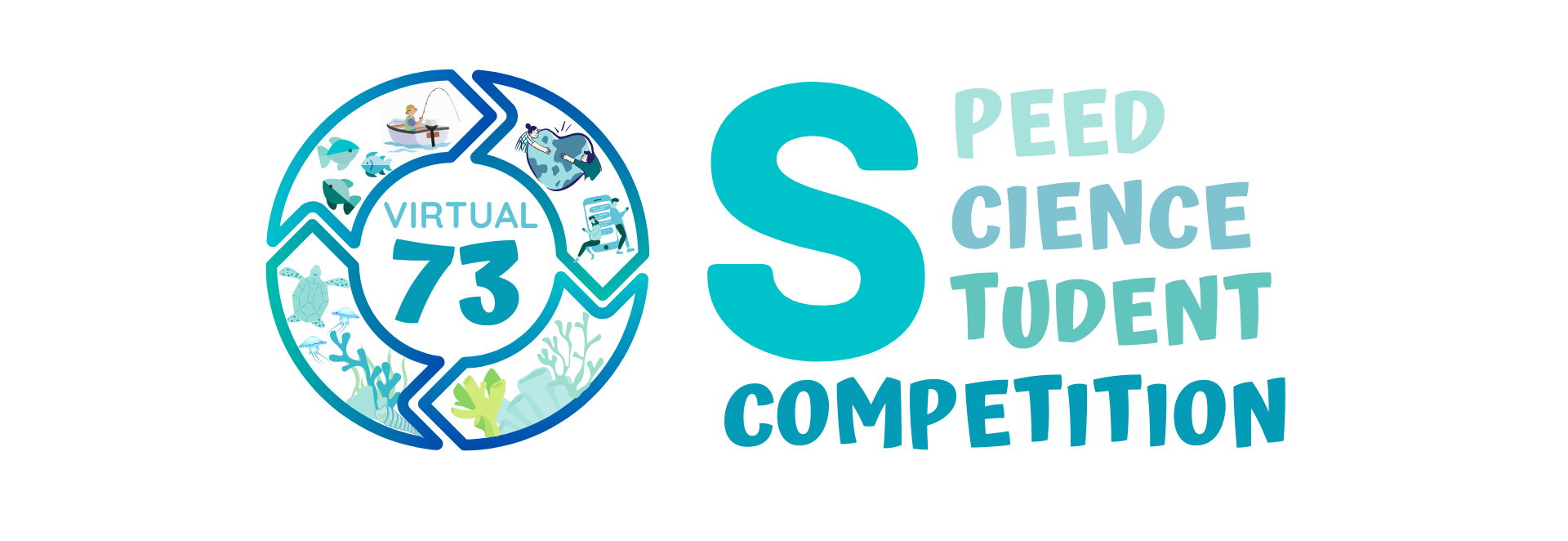 PLEASE NOTE THIS EVENT HAS BEEN CANCELLED DUE TO LOW RESPONSE
PLEASE NOTE THIS EVENT HAS BEEN CANCELLED DUE TO LOW RESPONSE
GCFI will introduce a Speed Science Student (SSS) competition that encourages students to combine their research and science communication skills. Using a single, static slide, students will aim to effectively present their primary research in three minutes in language appropriate to a non-specialist audience. This competition is inspired by the internationally recognised Three Minute Thesis Competition but will not be limited to doctoral students or those preparing a thesis. The deadline for video submission is 18 October 2020
Prizes (USD)
- First place: $500
- Second place: $250
- Third place: $150
- People’s Choice: $100
How it will work
- Students must submit their entry consisting of a YouTube video accompanied by a short description by 18 October, 2020 using this form
- Entry videos will be shared on GCFI’s Facebook Page and the one with the highest engagement receives the “wildcard” vote to have an automatic place in the finals.
- Finalists will move on to a live event where they will present to the GCFI audience and judging panel.
- There will be cash prizes for first, second and third place as well as a “People’s Choice” award based on live audience voting.
Eligibility
- Must be registered for the conference. Registration is FREE and can be completed on this page
- Must be a student or graduated in 2020 (undergraduate & postgraduate eligible)
- Must be based on primary research conducted by the student presenter
- Presentation must align with topics or themes typically covered at GCFI* (Please see below for full listing)
Rules
- Presentations are limited to 3 minutes and all entries exceeding 3 minutes will be disqualified. The three minute time period will commence once the presenter beings speaking (not at the start of the video)
- Presentations must be based on sound science and in the 3 minute presentation, this must specifically be addressed
- Presentations should consist of a single static slide (no slide transitions, animations or use of any sound or video files).
- Presentations should be in the form of spoken word (no poems, raps or songs) and without the use of any props or aids (e.g. costumes, musical instruments, laboratory equipment and animated backgrounds)
- The judges’ decision is final
Video criteria
- Presentation must be filmed at a horizontal (landscape) orientation from a static position and from one camera angle
- The presenter must have a plain background (no animations or green screen backgrounds)
- The presentation must contain a single slide which can be displayed in multiple ways (top right corner/right side/cut to)
Please note: competitors will not be judged on video / recording quality or editing capabilities. Judging will focus on the slide design, presentation, and the student’s ability to communicate research to a non-specialist audience.
Checklist for Preparing Your Entry
CONTENT & COMPREHENSION
- Did you explain the purpose and nature of your research?
- Did you help the audience understand the topic and broader context of your research?
- Did you address the methods and objectives of your research?
- Did you demonstrate how your research was based on sound science and relevant methods?
- Were you able to articulate the significance of your results to a non-scientific audience?
- Was your presentation concise and well organised, with a storyline throughout?
COMMUNICATION & ENGAGEMENT
- Did you avoid scientific jargon and define key terms when necessary?
- Did you help the audience understand why the research was important?
- Did you interest the audience so that they will want to know more about your work?
- Did you speak at an even pace so that no parts of your presentation were rushed?
- Did your single powerpoint slide enhance your talk? Was it visually appealing and concise?
Resources
Check out the University of Queensland’s Virtual Competitor Guide for additional advice on how to prepare and other recommendations
If you have any questions, please contact [email protected]
The deadline for video submission is 18 October 2020
______________________________________________
*Sample topics and themes typically covered at GCFI
- Reefs and associated ecosystems and fisheries
- Shallow and deep reef fishes
- Snapper and grouper fisheries
- Fish spawning aggregations
- Lionfish and other marine invasive species
- Queen conch, spiny lobster, and other invertebrates
- Marine Protected Areas Science and Management
- Pelagic ecosystem and recreational fisheries
- Continental shelf ecosystem fisheries
- Shrimp and demersal trawl fisheries
- Habitats and coastal management
- Coral reefs, mangrove and seagrass
- Climate change science and adaptation
- Sargassum science and management
- Aquaculture
- Marine litter science and management
- Small scale fisheries
- Gender in marine science and fisheries
- Fisher’s generational knowledge transfer
- Marine governance, livelihoods, and socio-economics
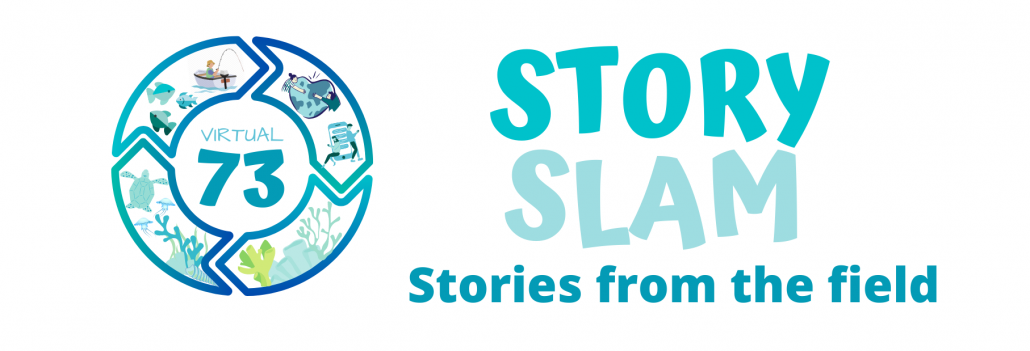 GCFI has introduced a virtual story slam focused on compelling stories from the field. These stories will feature experiences from field-work, unexpected interactions with a person or animal, influential mentors, or any other similar memorable experiences.
GCFI has introduced a virtual story slam focused on compelling stories from the field. These stories will feature experiences from field-work, unexpected interactions with a person or animal, influential mentors, or any other similar memorable experiences.
Stories being featured at GCFI73
-
Brice Semmens: “If my calculations are correct…”: A compendium of fieldwork failure stories
-
Bob Glazer: What conch surveys have taught me: conch are ferocious and conducting
surveys can be profitable
-
Kervelle Baird: South
-
Josselyn Bryan Arboleda: The great moray eel and the lionfishes
-
Chris Corbin: Necessity is the mother of innovation when monitoring pollution in the Caribbean
-
Megan Davis: An Island Conch Farmer with Tent and Wooden Car
-
Alex Fogg: Hangover IV – Fogg wanders Bogota
-
Lindy Knowles: Stranded on a sea of sand
-
Michelle Schärer: Perro Polizón (Stowaway dog)
-
Phil Karp: Lemonade from Lemons – Localizing Production of Lionfish Jewelry
-
Kristal Ambrose: Omens from the Ocean
 The CINEFISH Film Festival is going virtual this year!
The CINEFISH Film Festival is going virtual this year!
And to celebrate we will have 2 exciting approaches!
Firstly we will have a Live Virtual Film Screening Event on Wednesday 4, November at 5-7pm (EST) where several short films will be premiered for the GCFI73 Audience. There will also be some greetings from the various filmmakers and other behind the scenes footage! To join the live event, don’t forget to Register for the Conference (It’s FREE)! Check out the films being screened at the 2020 CINEFISH Film Festival here!
Secondly we will be introducing “CINEFISH At Home” where you can watch several films addressing marine issues in the region, from the comfort of your home, at your own convenience. Say goodbye to Netflix and say hello to CINEFISH At Home and have movie nights with your friends and family. All films shown at our live screening event will be available for viewing after Wednesday 4, November. Check out the films available for CINEFISH At Home here!
 Recreational fisheries management in the Gulf of Mexico and the Caribbean: Recent discoveries, current challenges, and future opportunities
Recreational fisheries management in the Gulf of Mexico and the Caribbean: Recent discoveries, current challenges, and future opportunities
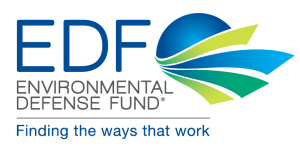 Organizer: Environmental Defense Fund and Gulf Caribbean Fisheries Institute,
Organizer: Environmental Defense Fund and Gulf Caribbean Fisheries Institute,
Conveners: Sepp Haukebo ([email protected]) & Eduardo Boné-Morón ([email protected])
Description: Participation in marine recreational fishing is growing around the world. Additionally, several recent scientific publications highlight the need for greater understanding of the opportunities and issues related to this growth, calling for commitments from institutions to better integrate the recreational component into broader fisheries management, conservation efforts and initiatives to strengthen coastal communities and livelihoods. The Gulf of Mexico and Caribbean combined, represents one of the largest recreational fishing fleets in the world. Many lessons have been learned regarding recreational fisheries management in the last 10 years with broad applicability in other regions around the world. Furthermore, managers and decision makers from several countries within the Gulf and Caribbean have recently been focusing more of their efforts on recreational reform. There is an opportunity through this session to lay the foundation for future efforts in this region, promoting a greater sense of community and sharing of effective practices with managers, fishers, scientists, NGOs, and decision makers.
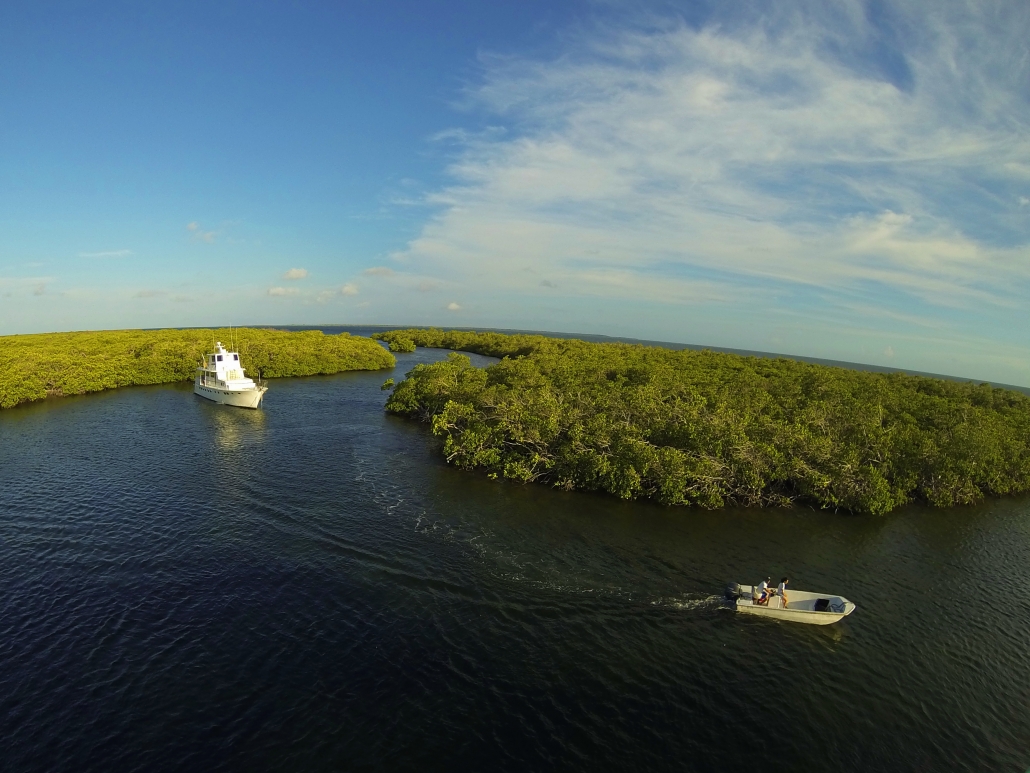
(c) Noel López Fernández
Recreational fishing can include a broad array of activities but for the sake of this session we propose using the FAO’s definition: “the fishing of aquatic animals (mainly fish) that do not constitute the individual’s primary resource to meet basic nutritional needs and are not generally sold or otherwise traded on export, domestic or black markets.”
The objective of this session is threefold:
- To share recent lessons learned regarding recreational fisheries management, including effective management practices, data collection, and incorporating recreational voices into the participatory process;
- To understand current needs and challenges of fisheries managers and stakeholders in specific countries around the region; and
- To outline opportunities for the GCFI network and the broader community to begin addressing the greatest needs and challenges.
This session will consist of 2 panel discussions, 1 workshop and a poster session. Further detail on these sessions are available on the GCFI Website.
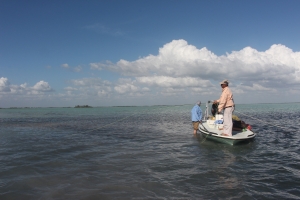 Panel 1 – Recreational fisheries management in the last 10 years – lessons learned, current efforts & challenges
Panel 1 – Recreational fisheries management in the last 10 years – lessons learned, current efforts & challenges
Keynote presentation followed by speakers (mainly fishermen, managers, and scientists) from Belize, the Bahamas, Cuba, and the U.S.A. Gulf of Mexico who will present case studies providing lessons learned from recreational fisheries management, research & policy over the last 10 years.
Panel 2 – Needs and opportunities for greater regional collaboration
Four speakers (mainly decision-makers and managers) from Belize, the Bahamas, Cuba, and the U.S.A. Gulf of Mexico will present case studies providing recent efforts and challenges to recreational fisheries reform. This will be followed by a group discussion on opportunities for the GCFI community to address the challenges and needs identified in the first portion of this panel.
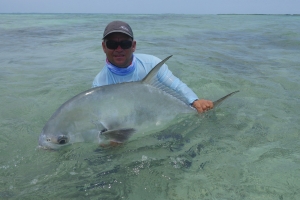
(c) Noel López Fernández
Workshop – Next steps to advance sustainable recreational fisheries in the region
EDF will facilitate a discussion around priority themes including effective management practices, data collection, incorporating recreational voices into the participatory process, monitoring efforts, enforcement and others. As a result, we expect to create a short report with recommendations tailored for decision-makers.
Followed by optional networking opportunity
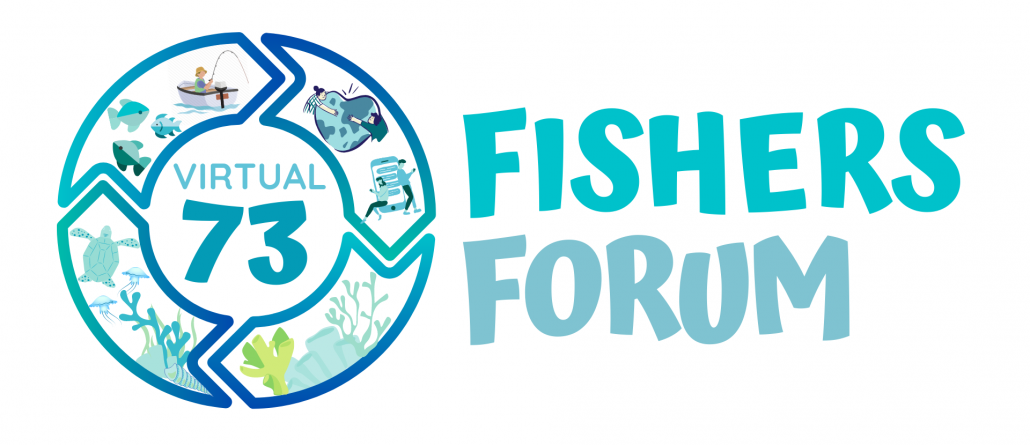
Join our Virtual Fishers Forum at GCFI73 as we hear from our GCFI Gladding Memorial Award Winners as they share experiences of fishers impacted by the COVID-19 pandemic. Our GMA winners will share perspectives of how COVID-19 has impacted their communities and how their communities are working together to respond to these impacts. The GMA Committee will moderate this first all-fishers panel to share insights on how COVID-19 have impacted local fisheries, and panel members will also share some of the positive activities ongoing in their communities that have uplifted and helped to recover fishers. Panelists will also share examples of how they are collaborating with others to coordinate, plan and implement longer-term responses to the ongoing pandemic.
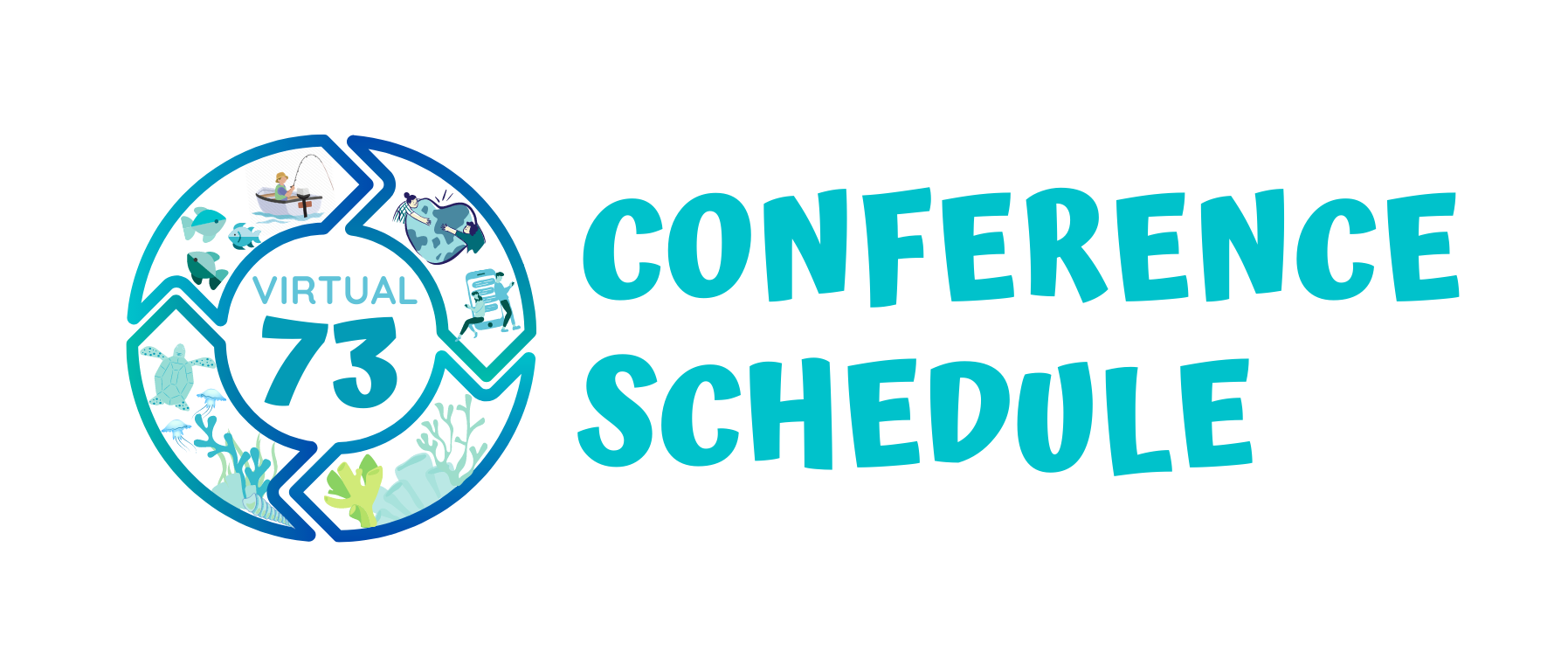
Please click on individual events to convert to your local time and add to your personal calendars.
Please note that Daylight Savings Time ends on November 1, 2020 so there will be 1 hour difference between Eastern Time (EST) and Atlantic Standard Time (AST)
| Time (EST) | Monday 2 November | Tuesday 5 November | Wednesday 4 November | Thursday 5 November | Friday 6 November |
| 10:00 – 11:00 |
Special Session
Needs and opportunities for regional collaboration for recreational fisheries management (Convened by EDF & GCFI) |
Thematic Keynote: Dr Cesar Toro |
STARTS AT 11AM
(Convened by EDF & GCFI) |
||
| 11:00 – 12:00 | Thematic Keynote: Dr Yvette Diei-Ouadi | ||||
| 12:00 – 13:00 | GCFI Membership Meeting | Fisher Forum | |||
| 13:00 – 17:00 | |||||
| 17:00 – 18:00 | GCFI73 Happy Hour |
No Activities Scheduled
|
CINEFISH Film Festival |
Meet the Board Social
Ask Board members about career advice or their research & get to know more |
|
| 18:00 – 19:00 | |||||
| 19:00 – 20:00 |
MONDAY 2 NOVEMBER
GCFI73 got off to a great start when our Keynote Speaker RDML Tim Gallaudet of NOAA launched NOAA’s Strategy for Stony Coral Tissue Loss Disease Response and Prevention. Check out a recording of his presentation here.
At the GCFI Membership meeting, 5 new Board members along with a new Chair and Vice Chair were elected. Please welcome our new officers: Dr Henri Valles (GCFI Chair), Dr Joanna Pitt (Vice Chair) and our new Directors: Dr. Alfonso Aguilar-Perera, Dr Dalila Aldana Aranda, Dr. Michelle Scharer, Bertha Simmons and Eric Wade
Finally we finished off Monday with the GCFI73 Happy Hour and E-Poster Session. All posters will remain live well beyond the conference and the GCFI73 E-Poster Showcase can be viewed here. Please continue to interact with authors via the chatbox.
TUESDAY 3 NOVEMBER
The second day of GCFI73 started with Keynote Speaker and recreational fisheries expert, Prof. Warren Potts, who kicked off the discussion with his presentation: Effective governance of recreational fisheries recommendations from research and experience. Today’s session aimed to establish a foundational understanding of recreational fisheries in the region, setting the stage for sharing lessons learned from recreational fishing management, understanding the current gaps in science and management, and evaluating the obstacles of stakeholders in the region to address priority challenges.
We also heard from five countries representing the Gulf of Mexico and the Caribbean region. We had over 100 attendees from various parts of the world tune in and participate in the first panel where we received great questions from panelists and attendees. If you weren’t able to make it, you can watch the recording of the presentation here.
WEDNESDAY 4 NOVEMBER
The third day of GCFI73 featured the 2nd special session on Recreational Fisheries Management in the Gulf of Mexico and the Caribbean: Recent discoveries, Current challenges, and Future Opportunities. Thanks to the support of translators, the session was delivered in English and Spanish, streaming to more than 100 attendees on Zoom and YouTube Live. Friends from Belize, Mexico, Cuba, the U.S. and the Bahamas shared experiences from the Gulf of Mexico and the Caribbean region, while participants and Keynote Speaker Warren Potts brought perspectives from around the world. Panelists answered questions from the audience, applying their expertise from local communities and institutions to address broader, shared issues across recreational fishing. The questions launched a lively discussion around regional collaboration to implement recreational fisheries reform. The session concluded with dialogue about the opportunities for the GCFI community to address the challenges and needs identified in the first portion of this panel. If you missed the panel today, you may follow this link for a recording!
We finished the evening with GCFI’s first ever Virtual CINEFISH Film Festival which featured six films that addressed various marine issues affecting the Gulf and Caribbean region. Rewatch some of these films along with several others through the CINEFISH At Home portal.
THURSDAY 5 NOVEMBER
Today we started looking towards the future thanks to two insightful keynote presentations. In a few months we will be entering the Decade for Ocean Science for Sustainable Development and Dr Cesar Toro has suggested that there is a need to harness, stimulate and coordinate interdisciplinary efforts at all levels, in order to support delivery of the information, action and solutions needed to achieve the 2030 Agenda for Sustainable Development and beyond. Dr Yvette Diei-Ouadi followed this by bringing the International Year of Artisanal Fisheries and Aquaculture (IYAFA) to a regional focus. Dr Diei-Ouadi emphasised the pivotal role played by SSA and SSF in food and nutrition security and poverty eradication, and emphasised that this contribution is yet not fully recognized which gives rise to marginalization, limited access to resources, exclusion from policy and decision-making processes, with high level of poverty and vulnerability. She revealed that the purpose of IYAFA is to sensitize public opinion and governments on these sub-sectors and on the importance of adopting specific public policies and programmes to enable them to operate in a sustainable manner. This provided the perfect foundation to lead into our Fishers Forum where our regional fishers shared their insights and experiences about how COVID-19 impacted them and their communities and recommended that a unified approach and development of innovative solutions was the only way to adapt. Catch up on all these events here.
FRIDAY EVENING
We finished off the technical part of the conference with our recreational fisheries workshop around priority themes including effective management practices, data collection, incorporating recreational voices into the participatory process, monitoring efforts, enforcement and others. This workshop served as a way to convene and determine next steps to advancing sustainable recreational fisheries in the Gulf of Mexico and Caribbean. After the workshop, we expect to create and share with the public, a short report with recommendations tailored for decision-makers. You can view a recording of the event here
GCFI73 came to an end with our Story Slam & Closing Ceremony where we all shared Stories from the Field, enjoyed performances from the Kingfish Trio and caught up with old and new friends. See a recording of the event here
Thank you to our interpreters and tech support team for working tirelessly to ensure we all remained connected and able to communicate! Thank you to all our Keynote speakers, moderators and panelists. Thank you also to the GCFI team for all of their efforts in the planning and executing of the meeting. Most of all, thank you to our audience for participating in GCFI73! We hope you enjoyed our virtual approach to GCFI73. Please complete our GCFI73 Evaluation Survey in English, Spanish or French to share your perspectives and help us to improve future GCFI Meetings.
See you at GCFI74!


